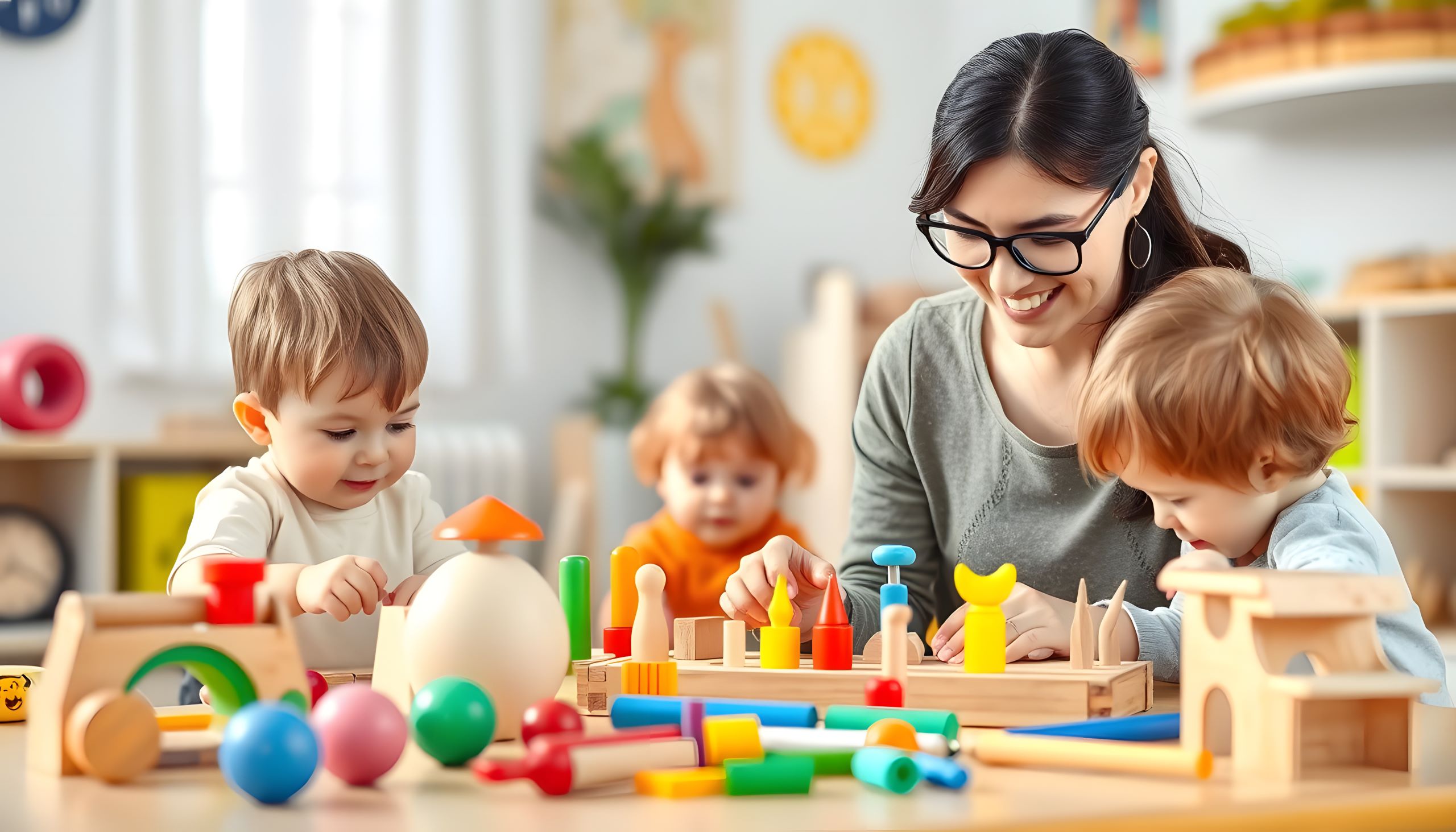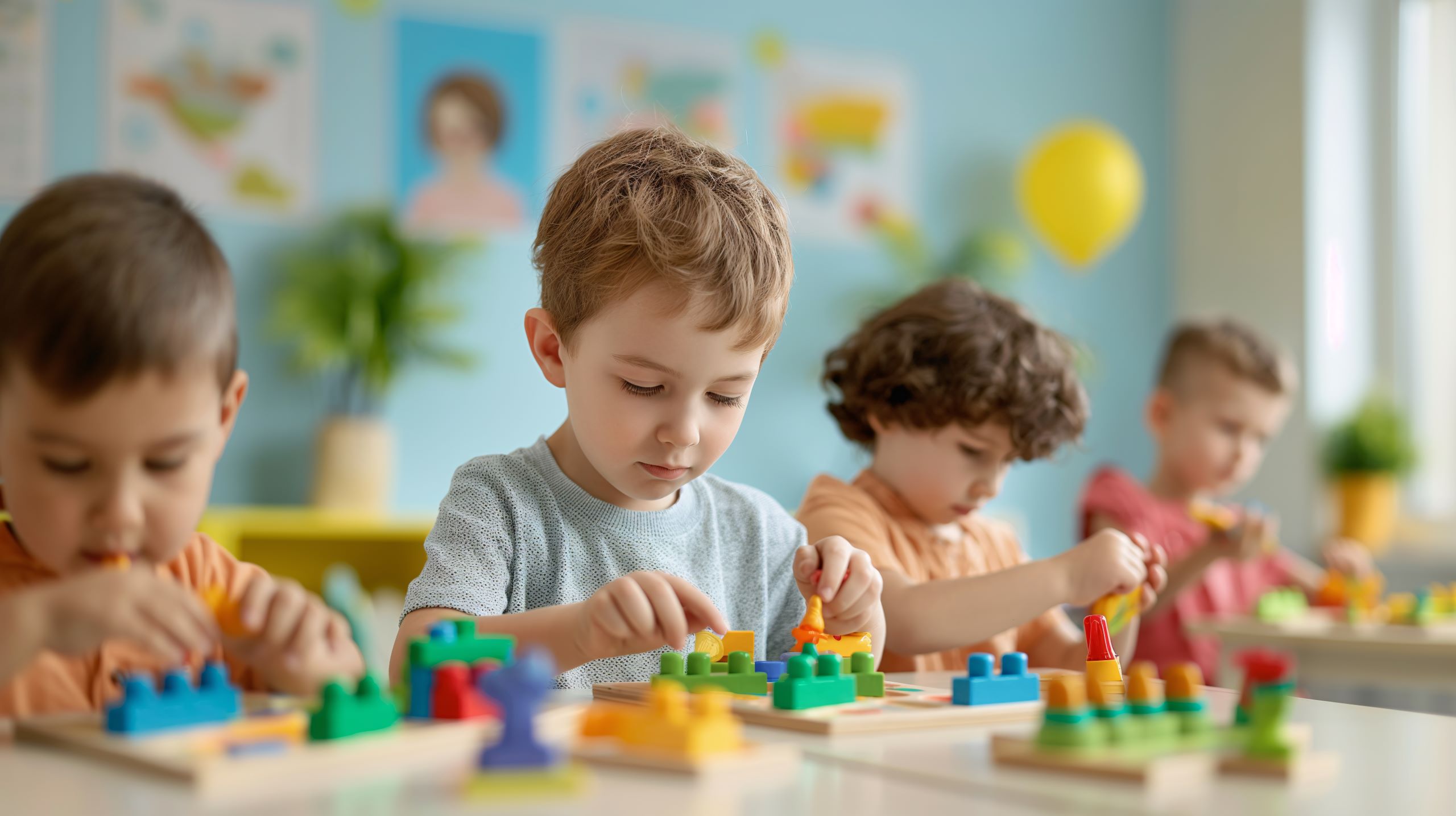
One of the main challenges for teachers and parents is helping kids build social skills. These skills—like sharing, talking to others, understanding feelings, and working together—are important for kids to get along with others and form good relationships. However, some children struggle to develop these skills because they have less free playtime and spend more time on screens. Teachers often find it hard to encourage social interactions in the classroom without making it too overwhelming for the kids. This is where play-based learning becomes helpful. Play isn’t just something kids do naturally. It’s also a great way to teach them social skills in a fun and comfortable setting. When used in early childhood education, play-based learning can greatly improve how children interact with others, communicate, and handle their emotions.
What Is Play-Based Learning?
Play-based learning is all about letting kids learn through play rather than structured lessons. It gives them the freedom to explore, try new things, and dive into activities that fuel their curiosity and problem-solving skills. Teachers are there to guide them, creating a fun and engaging space where learning happens naturally.
Play-based learning offers a range of benefits that support a child’s overall development. When children play, they encounter challenges that require them to explore different solutions, naturally developing their problem-solving abilities. Children learn to cooperate, share, and work together toward common goals, which enhances their ability to interact socially and form positive relationships. Additionally, successful play experiences boost self-esteem, giving children the confidence to take on new tasks and challenges with a positive mindset. At Lolo’s Little Darlins Daycare and similar childhood learning centers, play-based learning makes it easy for kids to pick up important life skills while having fun.

10 Tips to Integrate Play-Based Learning to Boost Social Skills
In early childhood education, play-based learning is a fantastic way to help kids build social skills. By focusing on activities that encourage interaction, you can create an engaging environment for learning. Here are 10 tips to make play-based learning more effective in developing social skills:
1. Create Cooperative Play Opportunities
Cooperative play teaches kids essential skills like teamwork, patience, and sharing by working together on a common goal. Whether they’re building a block tower or working on a puzzle, they naturally learn how to communicate, take turns, and collaborate. Not only does this type of play strengthen friendships and boost confidence, but it also makes learning fun. To encourage cooperative play, set up activities where kids must work together, like building a block city or organizing a scavenger hunt. In these scenarios, children practice communication and teamwork while having a great time.
2. Use Role-Playing Games
Role-playing allows kids to step into different roles and experience new perspectives, building empathy and communication skills. Games like “pretend restaurant” help children practice listening, problem-solving, and turn-taking in a playful setting. By acting out different social scenarios, kids gain confidence in navigating real-life situations. For instance, let one child be the chef, another the waiter, and the rest can act as customers. This helps them practice polite conversation, negotiation, and conflict resolution—all while having fun!
3. Encourage Turn-Taking Games
Turn-taking games like “Duck, Duck, Goose” or board games teach kids valuable lessons in patience, fairness, and respect. These games help children learn to wait their turn, manage their emotions, and communicate with others. Plus, they’re fun ways for kids to build connections with their peers. Simple games like “Simon Says” or “Candy Land” are great examples. They not only encourage turn-taking but also foster kindness and respect when kids cheer each other on.
4. Integrate Storytelling Activities
Storytelling is a wonderful way for kids to express their thoughts and boost creativity. In group settings, taking turns to add to a story encourages active listening and collaboration. It’s also a great way for kids to understand different perspectives and emotions, enhancing their empathy. For example, during circle time, start a story with, “Once upon a time, there was a dragon who loved cupcakes,” and let each child add to it. This activity helps them practice listening and working together to build something creative.
5. Promote Outdoor Play
Outdoor play offers kids a chance to explore and engage in physical activities in a less structured environment. Games like tag or hide-and-seek teach teamwork and problem-solving while allowing children to interact more freely. Outdoor play sparks creativity as kids invent their own games and scenarios. Try organizing team-based games like capture the flag or relay races. These activities encourage communication, collaboration, and positive social interaction as kids work together to succeed.
6. Include Group Art Projects
Group art projects, like creating a mural or sculpture, teach kids about teamwork and cooperation. By sharing materials and collaborating on a common goal, children practice communication, respect, and problem-solving in a creative way. Encourage children to work together on a large art piece, where they share ideas and materials, teaching them to respect each other’s input and work as a team.
7. Foster Problem-Solving Play
Problem-solving play encourages kids to tackle challenges together, building resilience and leadership skills. These activities help children learn to negotiate, make decisions, and cooperate with their peers, all while having fun. For instance, set up a challenge like building the tallest tower with limited materials. Kids will have to work together, share ideas, and divide responsibilities, learning valuable social and leadership skills.
8. Use Music and Dance to Encourage Interaction
Music and dance activities, such as group dancing or playing instruments together, provide fun opportunities for kids to interact and cooperate. These activities help children develop listening, coordination, and teamwork skills while boosting confidence and emotional expression. Try organizing a freeze dance game or a conga line, where children take turns leading the group. These activities foster leadership, inclusion, and communication.
9. Provide Free-Choice Playtime
Free-choice playtime allows children to choose activities that interest them, fostering independence and natural social interaction. Whether they’re building with blocks or playing dress-up, they’ll often begin to share ideas and cooperate with each other. By setting up various stations like a sandbox or puppet theater, you give kids the freedom to explore their interests while practicing social skills in a relaxed, playful environment.
10. Model Positive Social Interactions
Kids learn a lot by watching adults, so modeling positive behaviors like kindness, respect, and communication is key. When adults demonstrate taking turns, sharing, and calmly resolving conflicts, children are more likely to mirror these behaviors in their own interactions. By showing empathy and cooperation, adults help kids develop strong social skills, emotional intelligence, and the ability to build healthy relationships in a supportive environment.
These tips make it easy to integrate play-based learning into your child’s day, helping them build the social skills they need for success in and out of the classroom.
Social Skills to Learn in Early Childhood
Social skills in early childhood are essential for developing healthy relationships and communication abilities. These skills help children navigate their social environment, interact with peers, and form the foundation for future social success. Here are some key social skills to learn in early childhood:
1. Sharing and Taking Turns
Sharing and taking turns help children form friendships and foster cooperation. When children learn to share, they understand the value of fairness, while taking turns teaches patience. These skills can be developed through group activities or games that involve sharing toys or waiting for their turn, promoting a sense of community and collaboration.
2. Empathy
When children develop empathy, they become more considerate of the emotions and experiences of those around them. Parents and educators can nurture empathy by encouraging children to recognize emotions in others and discussing how they might feel in similar situations, helping them relate better to peers.
3. Listening
Active listening is crucial for understanding instructions and improving communication. When children practice listening, they are more likely to engage meaningfully in conversations, follow directions, and respond appropriately. Storytelling and listening games are excellent ways to help children focus on what others are saying, honing their ability to listen attentively.
4. Communication Skills
Effective communication encourages children to express their needs, ask for help, and resolve conflicts. Encouraging children to articulate their thoughts clearly and to make eye contact when speaking helps build strong communication skills. Through conversations, play, and interaction with others, they learn how to express themselves confidently and respectfully.
5. Cooperation
Children who cooperate well are able to work harmoniously with others, whether in a classroom setting or on the playground. Activities that require group participation, such as team sports or collaborative play, provide excellent opportunities for children to practice and enhance their cooperation skills.
6. Problem-Solving
Problem-solving is a critical skill that helps children navigate challenges and conflicts. When faced with difficulties, children who are taught to think through problems can find effective solutions. By guiding children with questions like, “What can we do to fix this?” or “What are our options?” they learn to approach problems with a solution-focused mindset, improving their ability to handle obstacles independently.
7. Respect for Others
Teaching children to respect others is key to fostering positive social interactions and maintaining harmony in relationships. Respect involves valuing others’ opinions, personal space, and boundaries. Parents and educators can model respectful behavior, showing children the importance of treating others with kindness and consideration in their daily interactions.
Conclusion
Parents and teachers support the integration of play-based learning to foster social skills in young children. Parents can encourage these skills at home by providing opportunities for imaginative play, guiding children through social interactions, and modeling positive behavior. Teachers, on the other hand, can create a structured yet flexible classroom environment where children feel safe to explore, interact, and learn from one another. Both parents and teachers can collaborate to ensure consistency in fostering communication, collaboration, empathy, and conflict resolution, ultimately helping children develop the social tools they need for healthy relationships throughout life.

Jessi is the creative mind behind The Coffee Mom, a popular blog that combines parenting advice, travel tips, and a love for all things Disney. As a trusted Disney influencer and passionate storyteller, Jessi’s authentic insights and relatable content resonate with readers worldwide.
